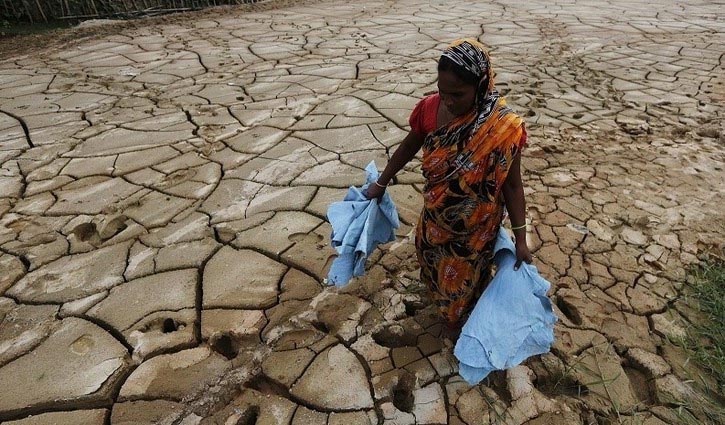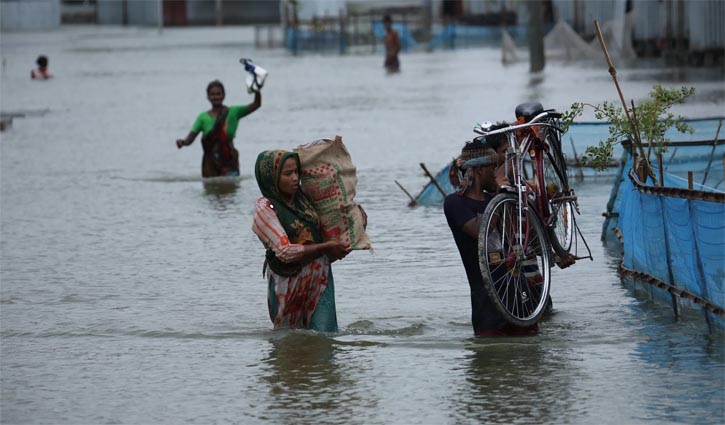Climate change poses severe threats to Bangladesh, urgent action needed
Hasan Mahmud || risingbd.com

An effect of climate change, cropland is bursting and flooding: Photo: Collected
Bangladesh is rich in natural resources. The fertility of the soil and the temperate climate allow for abundant crop production. Due to industrialization, the country has not faced significant difficulties. Our labor is cheap, which has made us known for our productivity. However, without any fault of our own, we are facing consequences due to climate change. The industrialized nations are responsible for carbon emissions. Bangladesh is not significantly responsible for global climate change, yet we are the ones suffering the most.
Although the climate has been changing since the beginning, the effects have just become apparent in recent decades. It is impacting Bangladesh with increased extreme weather events, rising sea levels, and food insecurity, necessitating adaptation strategies like building seawalls, diversifying crops, and investing in early warning systems.
Bangladesh ranks at the top of the list of countries affected by climate change. According to the Global Climate Risk Index published by the international research organization Germanwatch in 2010, Bangladesh is the most impacted country in terms of damage caused by climate change among the top ten-affected nations. The survey was conducted on 193 countries from 1990 to 2009. It is worth noting that in the reports published by the same organization in 2007 and 2008, Bangladesh was also identified as the most affected country.
Scientists say that if global warming continues at the same rate, a large area of Bangladesh will be flooded in the next 100 years, and about 30 million people will become refugees.
Due to the country's geographical location, population density, and economic structure, Bangladesh will be severely impacted by the negative effects of climate change. Numerous statistics clearly indicate that significant changes are occurring and will occur in the country's ecosystems and the livelihoods of its people as a result of climate change.
Experts say climate change has become a global crisis. The changing climate is increasingly posing a significant challenge to the existence of human civilization. It is an issue that does not respect the boundaries of countries, nations, subcontinents, or continents. The impacts of climate change are already being felt, and urgent action is needed to reduce vulnerability and build resilience.
Climate Change and its Impact in Bangladesh
According to environmental scientists, Bangladesh is one of the countries most affected by global warming. The major natural disasters that have been occurring in Bangladesh in recent times are mainly due to climate change. Following are the top effects in Bangladesh. They are; Changed Natural seasonal characteristics, decreasing natural resources in Bangladesh, Sea Level Rise, Biodiversity Destruction, Flash floods, Drought, Decrease in River Flow and Increase in Salinity of Water, Ocean Storms and Tidal Surges, etc.
Severe Impact on Agriculture
Agriculture is the lifeblood of Bangladesh's economy. The economy and livelihoods of Bangladesh are built on four pillars, one of which is agriculture. Climate change is having a significant negative impact on agriculture. The agricultural sector is considered the most vulnerable industry. This is because its productivity entirely depends on factors such as temperature, rainfall, solar radiation, sunlight duration, and climate-related conditions.
The average rainfall in Bangladesh has significantly increased compared to previous years. This average annual rainfall is expected to rise further by 2030. More than 80% of the land in Bangladesh is flood-prone. Floods caused by tidal surges cause extensive damage in coastal areas. Currently, around 1.5 million hectares of land in Bangladesh are affected by floods each year. In hilly regions, excessive rainfall erodes the fertile topsoil of elevated areas, gradually diminishing the soil's fertility and making it increasingly unsuitable for crop production.
Another major barrier to crop production in Bangladesh is drought, which is becoming more pronounced due to climate change. Drought occurs when the rate of evaporation exceeds that of precipitation in a particular area. In Bangladesh, 60% of the 8.3 million hectares of arable land affected by different levels of drought is used for cultivating Aman rice. Additionally, crops such as Aus and Boro rice, jute, pulses, oilseeds, potatoes, sugarcane, and winter vegetables are severely impacted by drought conditions.

The number of floods is gradually increasing, this is also an effect of climate change: Photo: Collected
River erosion is increasing due to climate change. As a result, a lot of productive agricultural land is disappearing into the riverbed. According to a survey by the Bangladesh Water Development Board, 1,200 kilometers of riverbanks have been eroded so far and another 500 kilometers are at risk of erosion.
Agriculture in Bangladesh is facing various threats such as irregular and insufficient rainfall, insufficient irrigation water due to low water tables, floods in coastal areas at various times besides the monsoon season, increased salinity due to rising sea levels, and land being submerged in water.
Affecting human health
Climate change is impacting health in a myriad of ways, including by leading to death and illness from increasingly frequent extreme weather events, such as heatwaves, storms and floods, the disruption of food systems, increases in zoonoses and food-, water- and vector-borne diseases, and mental health issues. In Bangladesh leading to increased risks of infectious diseases, heat-related illnesses, and mental health issues, exacerbated by extreme weather events and environmental degradation.
What can we do
While developed nations bear the primary responsibility for climate change, it is imperative that the global community collaborates to address this pressing issue. Our contribution should focus on implementing comprehensive afforestation initiatives. Trees play a crucial role in absorbing harmful carbon dioxide and releasing oxygen, thereby helping to maintain environmental balance.
The initiation of afforestation programs should be prioritized in coastal and riverine regions of the country. This will mitigate riverbank erosion and lessen the severity of sea storms. Concurrently, it is essential to halt deforestation.
In addition, efforts must be directed towards reducing the emissions of harmful gases that contribute to atmospheric warming. Industries should prioritize energy conservation and adopt measures to treat waste effectively.
Bangladesh is prone to natural disasters, with various types occurring annually. As climate change intensifies, these disasters are expected to become more severe in the coming years. Therefore, it is crucial to raise awareness and prepare adequately for the challenges ahead.
Experts Opinion
Dr. Mohammad Tarikul Islam, Professor of Government and Politics at Jahangirnagar University, Bangladesh said that, The Government of Bangladesh has made a few significant moves in recent years to establish institutional frameworks for efficient and organized disaster management and easing the suffering of disaster and climate victims. But Bangladesh is a disaster-prone nation. We are now at great risk for various reasons.
He stated like other countries of the Global South, climate change has elicited a rise in extreme weather phenomena such as floods, droughts, extreme temperatures, heavy rains, and storms. Climate change events are more frequent, and impact all facets of human existence.
Dr. Mohammad Tarikul Islam said, beyond city innovations, there are opportunities to learn from and collaborate with neighboring countries. Through mutual cooperation, the nations of South Asia could help each other adapt to difficult situations, learn from one another, and even prosper. Having consistently supported the Global South in gatherings like COP, the G20, and the Voice of the Global South Summit, both India and Bangladesh have institutional expertise they may draw upon; therefore, they should leverage resources to solve their common concerns and raise their voices on the international scene by putting up a single front.
Dr Rejaul Karim, Associate professor of Varendra University said, at the global stage, Bangladesh is engaged in climate diplomacy, promoting the need for more ambitious objectives to limit the increase in global temperatures and to assist vulnerable countries, including itself. The Global Goal on Adaptation, a significant result of the Paris Agreement, seeks to bolster the resilience of nations like Bangladesh through both financial and technical assistance.
Furthermore, he emphasized that tackling the climate crisis necessitates more than just local initiatives. Bangladesh has been a strong proponent of climate finance, calling on developed countries to honor their obligations to the Green Climate Fund and other international support frameworks. Global collaboration is essential, particularly as Bangladesh's adaptation strategies demand considerable investment.
Dhaka/Mukul























